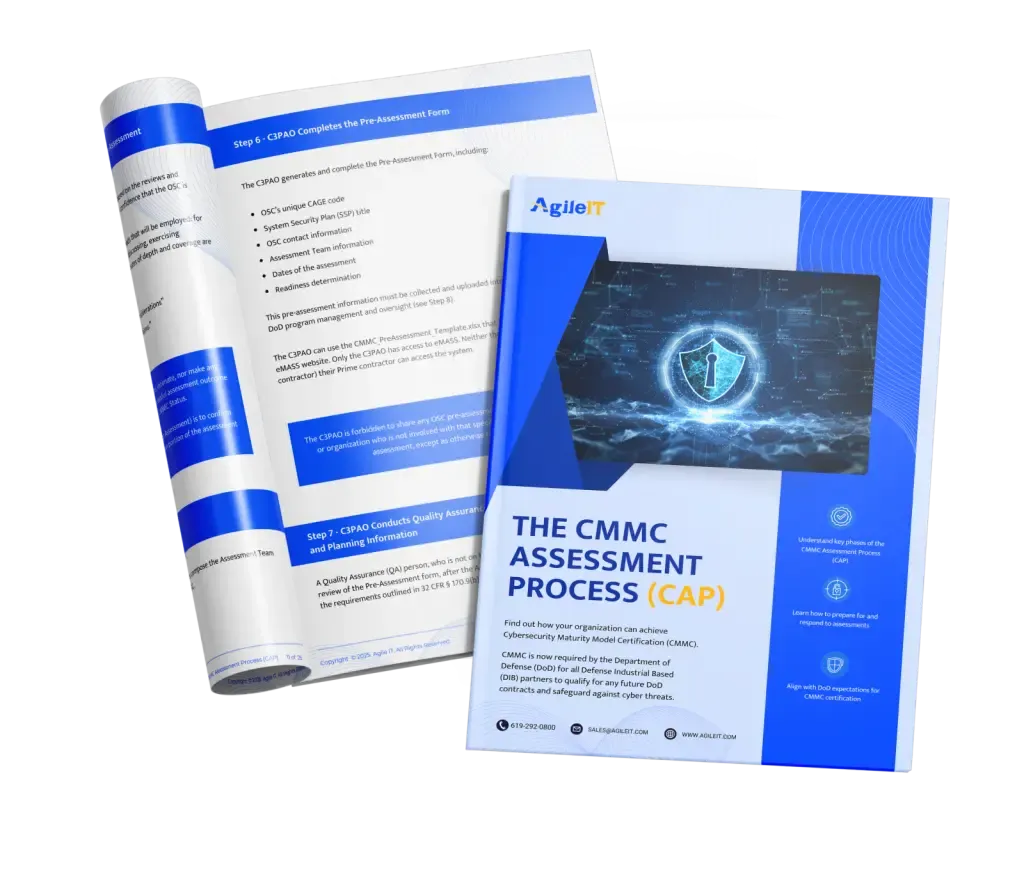MSP vs. In-House Support for CUI Data Management
Compare MSP vs. in-house support for CUI data management. Explore cost, expertise, compliance readiness, and which approach best protects sensitive government data.

This is Post #2 of our CUI Compliance with MSPs Series
Catch up on the first post and then finish the series:

For organizations that handle sensitive government data such as Controlled Unclassified Information (CUI), proper data management is essential not only to protect their business, but also to ensure compliance with federal cybersecurity regulations such as FAR CUI, DFARS, and CMMC 2.0. Maintaining the proper cybersecurity posture to ensure compliance with these regulations not only ensures you maintain your contractual compliance obligations, but it is also essential to national security. However, maintaining compliance with these stringent federal guidelines can pose a challenge for government contractors, particularly if you have limited in-house IT resources and your team does not have experience working with federal compliance frameworks. In this case, you may find it beneficial to partner with an IT Managed Service Provider (MSP) who specializes in providing compliance support, such as Agile IT. Of course, this may leave you wondering what benefits there are to outsourcing your CUI data management to an MSP, and how you’ll know if this is the right option for you. To help you make this important decision, keep reading as we explore the pros and cons of each option and how you’ll know whether you need an MSP for CUI data management.
In-House Support: Pros and Cons
Maintaining an in-house IT team is the traditional choice for a reason, as many business owners prefer the direct control and faster response times that typically come with having their IT team on-site. Yet, when it comes to safeguarding CUI, in-house teams may not have the knowledge to properly protect this data. Whether you’re a new or established government contractor trying to decide what type of IT services will better suit your needs, here’s a look at the pros and cons of maintaining in-house IT support.
Pros
-
You Have Direct Control: By maintaining an in-house IT team, you have direct control over your IT personnel, infrastructure, and data management processes. This is often appealing to managers who prefer to have direct oversight of the people controlling their company’s most sensitive data.
-
Familiarity With Internal Systems: Unlike an MSP, who will inevitably work with multiple companies, your company is your in-house IT team’s sole focus. This means that your IT personnel will have a deep understanding of your company’s specific needs, internal systems, and business processes.
-
Faster Response Times: One of the biggest concerns organizations often have about outsourcing their IT needs is that it may take a while for them to get support. Alternatively, if something breaks down or there is a data breach and you have an in-house IT team, your IT personnel will be right down the hall and can provide immediate support for time-sensitive issues.
Cons
-
Staffing Considerations: Of course, maintaining an in-house IT team is not without its challenges, and one of the biggest challenges government contractors often face is finding skilled IT personnel with compliance experience. Filling vacant positions can be a time-consuming and costly endeavor, and if your business experiences rapid growth, scaling your in-house IT team can prove challenging.
-
Costs: For small government contractors, maintaining an in-house IT team can also prove extremely costly. The fact is that recruiting, training, and retaining in-house IT professionals with compliance knowledge can prove to be cost-prohibitive for many of these organizations.
-
Limited Expertise: CUI data management and compliance support is an extremely niche area of IT that requires specialized knowledge and training. Unfortunately, your options when hiring IT personnel may be limited by your resources as well as the local talent pool, which can make it difficult to find IT professionals with the right knowledge and experience to ensure your CUI is properly secured.
Managed Service Providers (MSPs): Pros and Cons
With the latest technology making it easier for teams to collaborate across the country, more government contractors are choosing to outsource their IT needs to a managed service provider. Not only can this be a more cost-effective option (more on that in the next section), but it also gives these organizations access to the specialized knowledge and resources needed to ensure their CUI is properly protected. If you’re unsure whether switching to an MSP is right for your organization, take a look at the pros and cons of doing so below.
Pros
-
Compliance Specialization: One of the biggest advantages of working with an MSP for CUI data management is that this allows you to choose an MSP that specializes in compliance management. This will give you access to experienced IT professionals with the specialized knowledge necessary to help you achieve and maintain compliance with complex federal regulations.
-
After-Hours Monitoring and Support: The fact is that data breaches can happen at any time of the day or night; yet, most small businesses only have two or three IT personnel who work a typical 9-5 schedule. Partnering with an MSP can then enhance the security of your CUI, as these providers have the resources to provide after-hours services, including 24/7 monitoring and support.
-
Risk Management and Responsiveness: Having more personnel also means that MSPs have the resources necessary to properly respond to a data breach to minimize damage and ensure proper procedures are followed to meet federal guidelines. Furthermore, they also have the resources and experience to provide audit support and proactive threat mitigation services, which can significantly reduce your risk of succumbing to a data breach in the first place.
-
Simple Scalability: MSPs have the resources and personnel necessary to allow you to scale your services instantly as your organization’s data management needs change. This can provide significant peace of mind to organizations seeing rapid growth, as they won’t have to scramble to try and hire more IT personnel.
Cons
- Reduced Control: Of course, one of the biggest perceived downsides of outsourcing IT is that you have to give up control of your IT infrastructure to a third party. This can make it harder to oversee priorities, timelines, and responses in real time compared to having an in-house team.
- Possible Delayed Response: Depending on the size and capabilities of the MSP you partner with, response times may be delayed, as it may take a while for them to get back to you. Of course, this varies significantly from one provider to the next, making it essential that you ask an MSP you’re considering working with about their response times.
Cost Comparison In-House vs. MSP
Cost is usually one of the biggest deciding factors for organizations choosing between in-house and outsourced IT services. This is why MSPs have grown so popular in recent years, as working with an MSP can help you control ballooning IT costs. The fact is that maintaining an in-house IT team can be expensive, with the salary alone for a single senior IT professional easily being $125,000 or more. Alternatively, when you partner with an MSP, you pay a set monthly fee for their services. Not only does this make it easier to predict your monthly IT expenses, but it can also save you a significant amount of money, as these services take advantage of economies of scale by spreading out IT costs across their customers. This lowers overall IT costs, making partnering with an MSP much more affordable for small businesses.
When to Choose an MSP
So, how exactly will you know whether maintaining an in-house IT team or outsourcing your IT needs to an experienced MSP is the right choice for your organization? Ultimately, this will come down to a variety of factors, including your budget, how much time you have to hire, train, and onboard IT personnel, and whether your team has the expertise to handle compliance frameworks. In many cases, small to medium-sized organizations that maintain government contracts are better off working with an MSP, as this not only saves them time and money, but MSPs also provide specialized knowledge and expertise that can help ensure you’re able to keep up with the Department of Defense’s (DoD) ever-evolving cybersecurity guidelines for organizations handling CUI.
Consider Partnering With Agile IT for Your CUI Data Management Needs
Choosing the right IT solution is essential when handling CUI if you want to ensure you are maintaining your compliance obligations and protecting national security. While maintaining an in-house IT team can provide certain benefits, and it may be feasible for larger organizations, small to medium-sized businesses will likely benefit from outsourcing their IT and compliance needs to a managed service provider. The fact is that working with an MSP like Agile IT that has experience handling compliance can go a long way in saving you time and money while reducing risks and improving data security.
If you’re in need of expert-managed support for CUI compliance, consider contacting Agile IT today to learn about our IT and compliance services. Whether you are required to comply with CMMC or need to align to NIST 800-171we have the proven expertise, tools, and dedicated team to help you achieve and maintain compliance with confidence.






